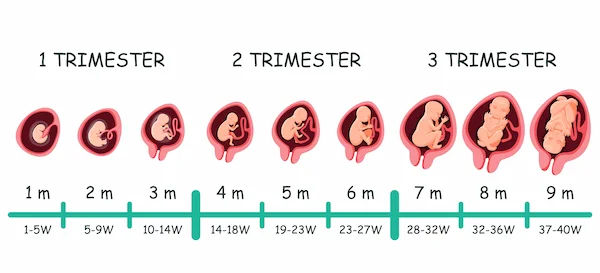Your Ultimate Guide to a Healthy Pregnancy: From Planning to Delivery
Know about the healthy pregnancy, three trimester changes, mental and emotional well-being and more.

Written by Dr. Shaik Abdul Kalam
Reviewed by Dr. D Bhanu Prakash MBBS, AFIH, Advanced certificate in critical care medicine, Fellowship in critical care medicine
Last updated on 13th Jan, 2026

Introduction
Embarking on the journey to motherhood is one of life's most exciting adventures. A healthy pregnancy is the best possible start you can give your baby, and it begins long before you see those two pink lines. This comprehensive guide is designed to walk you through every stage, from the initial planning phase to the final weeks before delivery. Think of it as your trusted companion, offering evidence-based advice, practical tips, and supportive insights to empower you throughout this incredible transformation. We'll cover everything from essential nutrients and safe exercise routines to navigating prenatal appointments and prioritising your mental wellbeing.
The Preconception Phase: Laying the Foundation for a Healthy Pregnancy
The steps you take before conception are crucial for setting the stage for a smooth pregnancy and a healthy baby. This phase, often called preconception care, is about optimising your health to create the best possible environment for your future child.
Consult a Top General Practitioner for Personalised Advice
Schedule a Preconception Checkup
Your first step should be to schedule a preconception checkup with your healthcare provider. This visit is more than just a confirmation; it's a strategic planning session. Your doctor will review your medical history, current medications, vaccination status, and any chronic conditions. They can identify potential risks and provide personalised guidance. If you have concerns about irregular cycles or have been trying to conceive without success, this is the perfect time to discuss them. For convenient and expert advice, you can consult a gynaecologist online with Apollo24|7 to get your questions answered from the comfort of your home.
Start Taking Folic Acid
One of the most critical actions you can take is to start taking a folic acid supplement. The CDC recommends that all women of reproductive age consume 400 micrograms (mcg) of folic acid daily. This B vitamin is essential for preventing serious neural tube defects in the baby's brain and spine, which develop in the very first month of pregnancy—often before you even know you're pregnant. Many experts suggest starting at least three months before you plan to conceive.
Review Your Lifestyle Habits
The lifestyle habits include:
Nutrition and Weight Management
Achieving a healthy weight before pregnancy can reduce the risk of complications like gestational diabetes and high blood pressure. Focus on a balanced diet rich in fruits, vegetables, lean proteins, and whole grains. This is also an excellent time to reduce processed foods and sugar intake. If you need a baseline, Apollo24|7 offers convenient home collection for tests like vitamin D or HbA1c to check your nutritional status.
Substance Avoidance: Smoking, Alcohol, and Drugs
Smoking, alcohol, and recreational drugs can significantly harm a developing fetus and increase the risk of miscarriage, preterm birth, and birth defects. If you need support to quit, your doctor can connect you with resources. Your partner should join you in these healthy changes, as secondhand smoke can also pose risks.
The First Trimester: Navigating Early Changes (Weeks 1-12)
The first trimester is a period of rapid development for your baby and a significant adjustment for you. While exciting, it can also be challenging due to common early symptoms.
Your First Prenatal Visit: What to Expect
Your first official prenatal appointment is typically around 8 weeks. It will be comprehensive, including a physical exam, blood tests to check your blood type, iron levels, and immunity to certain diseases, and possibly a dating ultrasound to confirm your due date. Come prepared with questions about your pregnancy nutrition, exercise limits, and what to expect in the coming weeks.
Managing Early Pregnancy Symptoms
From fatigue and nausea to breast tenderness, the first trimester can be tough. For managing morning sickness, try eating small, frequent meals, snacking on ginger biscuits, and staying hydrated. Listen to your body and rest when you need to—this fatigue is normal as your body works hard to grow the placenta.
Nutritional Needs in the First Trimester
Even if nausea makes eating difficult, focus on getting enough folic acid, iron, and calcium. Your doctor will likely recommend switching from a basic folic acid supplement to a full prenatal vitamin that includes iron and DHA, an omega-3 fatty acid important for the baby's brain development.
The Second Trimester: The "Honeymoon Period" (Weeks 13-26)
Many women find the second trimester to be the most enjoyable. Energy levels often return, nausea subsides, and you start to "show," making the pregnancy feel more real.
Key Developmental Milestones
This is a period of incredible growth. Your baby’s organs mature, and you will likely feel the first fluttering movements, known as "quickening," between 16 and 22 weeks. This connection can be a profound and joyful experience.
Exercise and Fitness Modifications
Staying active is fantastic for your mood, energy, and pregnancy health. Activities like walking, swimming, and prenatal yoga are generally safe. However, as your belly grows, avoid exercises that involve lying flat on your back or have a high risk of falling. Listen to your body and modify as needed.
Preparing for Anatomical Scans
Around 18-20 weeks, you'll have a detailed ultrasound called an anatomy scan. The sonographer will meticulously examine your baby’s anatomy, from the brain and heart to the spine and limbs. It’s a lengthy but fascinating appointment that can provide great reassurance about your baby's development.
The Third Trimester: The Final Countdown (Weeks 27-40+)
You're in the home stretch! The third trimester is about final preparations, both physically and mentally, for labour and delivery.
Monitoring Your Health and Baby's Movements
You'll have more frequent prenatal visits now to check your blood pressure, measure your growing belly, and monitor the baby's heart rate. Pay close attention to your baby's movement patterns. If you notice a significant decrease, contact your healthcare provider immediately.
Preparing for Labour and Delivery
Take this time to educate yourself. Consider enrolling in a childbirth class, creating a birth plan (while staying flexible), and packing your hospital bag. Installing the car seat is another key task to check off your list.
Recognizing Signs of Preterm Labor
It's important to know the warning signs of preterm labour before 37 weeks, such as regular contractions, constant lower back pain, or a change in vaginal discharge. If you experience any of these, seek medical attention promptly.
Mental and Emotional Well-being Throughout Pregnancy
A healthy pregnancy isn't just about physical health; your mental and emotional state is equally important.
Managing Stress and Anxiety
Pregnancy can be an emotional rollercoaster—practice stress-reduction techniques like mindfulness, deep breathing, or prenatal meditation. Don't hesitate to talk about your fears and anxieties with your partner, friends, or a therapist. If you feel overwhelmed by anxiety or symptoms of depression, consult a doctor online with Apollo24|7 for confidential support and guidance.
The Importance of a Support System
Lean on your partner, family, and friends. Connecting with other expectant parents through support groups or online communities can also be incredibly valuable, as they truly understand what you're going through.
Conclusion
A healthy pregnancy is a journey of making mindful choices, practising self-care, and partnering with your healthcare team. By taking proactive steps from the preconception stage through each trimester, you are actively contributing to the well-being of both yourself and your baby. Remember that every pregnancy is unique, so be kind to yourself and focus on progress, not perfection. Embrace the changes, celebrate the milestones, and don't hesitate to ask for help along the way. This is your journey to motherhood—nurture it with confidence and joy.
Consult a Top General Practitioner for Personalised Advice
Consult a Top General Practitioner for Personalised Advice

Dr Syed Mateen Pasha
General Physician
2 Years • MBBS
Bengaluru
PRESTIGE SHANTHINIKETAN - SOCIETY CLINIC, Bengaluru

Dr. Anand Ravi
General Physician
2 Years • MBBS
Bengaluru
PRESTIGE SHANTHINIKETAN - SOCIETY CLINIC, Bengaluru

Dr. Vivek D
General Physician
4 Years • MBBS
Bengaluru
PRESTIGE SHANTHINIKETAN - SOCIETY CLINIC, Bengaluru

Dr. Syed Ismail Ali
General Practitioner
7 Years • MBBS
Hyderabad
Apollo 24|7 Clinic, Hyderabad

Dr. Debajyoti Goswami
Obstetrician and Gynaecologist
10 Years • MBBS,D.G.O(DNB),Adv. Infertility Tech.(AIIMS),Fellowship in Diabetes(U.K),Comprehensive Abortion Care(Govt. Of W.B), Certificate in Clinical Embryology(AIIMS, BHUBANESWAR)
Bankura
D.G Clinic, Bankura
(25+ Patients)
More articles from pregnancy
Frequently Asked Questions
1. What are the best prenatal vitamins to take?
Look for a prenatal vitamin that contains at least 400 mcg of folic acid, iron, calcium, and DHA. It's best to choose one recommended by your doctor, as they can account for your specific health needs.
2. How much weight should I gain during a healthy pregnancy?
Weight gain depends on your pre-pregnancy BMI. Generally, women of a healthy weight are advised to gain 25-35 pounds. Your doctor will provide a personalised target for you.
3. What exercises are safe during pregnancy?
Most low-impact exercises are safe, including walking, swimming, stationary cycling, and prenatal yoga. Avoid contact sports, activities with a high risk of falling, and exercises that involve lying on your back after the first trimester.
4. When should I announce my pregnancy?
This is a personal decision. Many couples wait until after the first trimester (12-13 weeks) when the risk of miscarriage decreases significantly, but there is no right or wrong time.
5. What foods should I absolutely avoid?
To prevent foodborne illnesses, avoid unpasteurized dairy and juices, raw or undercooked meat and seafood, deli meats unless heated steaming hot, and high-mercury fish like shark, swordfish, and king mackerel.
.webp)



